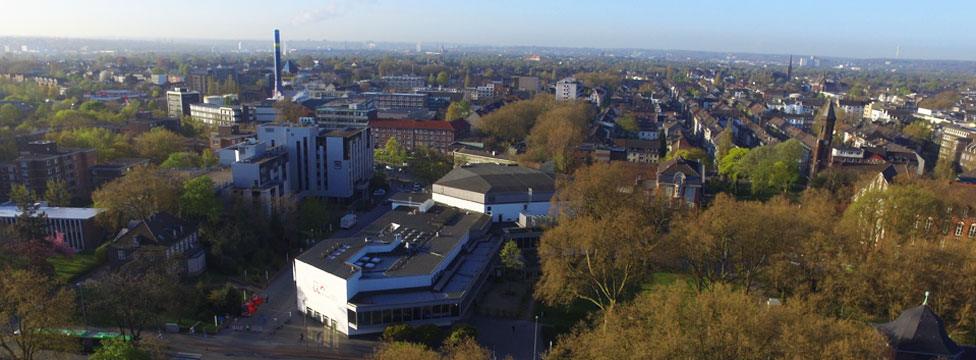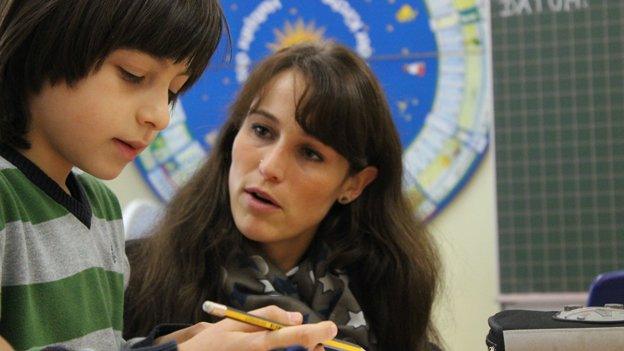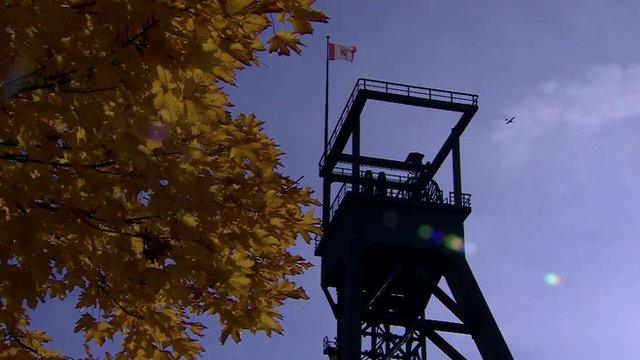Migrant Crisis: Changing attitudes of a German city
- Published

"When the first refugees arrived here in Oberhausen we had a big welcome culture, this has calmed down," says Joerg Fischer, manager of a Red Cross refugee transit camp in Oberhausen in Germany.
In the six months since BBC News first visited Oberhausen, the mood here has changed.
The majority of people still welcome new arrivals, but there are some who say they are creating a strain on a local economy with an 11% rate of unemployment.
Oberhausen lies in the western region of North Rhine-Westphalia, which took in an estimated 21% of asylum seekers in 2015, more than anywhere else in the country.
Nearly 3,000 refugees, many fleeing conflict in Iraq, Syria and Afghanistan, settled in Oberhausen last year.
A BBC team first visited in October 2015 and has returned to speak to aid workers, residents and the asylum seekers themselves.
Some say the increasing numbers of migrants is creating a strain on the local economy
How was Oberhausen coping when the BBC visited in 2015?
Last October, Joerg Fischer was struggling with the constant flow of new arrivals in his refugee transit camp in Central Oberhausen.
But since the start of the year, the closure of border crossings in the Balkans has significantly reduced the movement of migrants into Europe.
"We are on top of the situation. This is why we can close down this camp for example… but still we do not think it is the end of this situation… that is why this camp will be on standby and will not be terminally closed."
Many of the migrants and refugees who arrived at the Red Cross transit camps have now been rehoused in private accommodation.
By late April, 1,721 migrants were living in homes provided for by the city council. A further 1,092 were living in the camps.
Culture clashes
Twenty two-year-old Khaled Kohestani, from Afghanistan, is one of the lucky ones. He's just moved into a one-bedroom flat with his wife and baby after three months of living in a camp.
Khaled Kohestani has sometimes struggled to understand local customs
Khaled has begun learning German and is looking for work. He says he's been treated very well by the people of Oberhausen, but has struggled at times to understand German customs:
"When we get on the bus in our country everyone is friendly and they say hello to each other," says Khaled with a smile on his face.
"But here people are just sitting and they just want to keep their privacy. We tried to be quiet and not say anything because we are scared, we don't know the rules, maybe it's illegal to talk? But nowadays I understand it and it has become a little better for me."
Social etiquette has also become an issue at AQUApark, Oberhausen's biggest swimming pool. General Manager Timor Schrimer says the pool's rules have been printed in Arabic on leaflets to help the new arrivals understand German customs.
Oberhausen's biggest swimming baths have had their rules printed in Arabic
It follows an incident where a German woman was groped in the pool by a migrant. The police were called to the swimming pool and arrested a man. He's since released without being prosecuted.
Oberhausen police say there have been seven recorded cases of disturbances relating to the new arrivals since July 2015. Most were due to anti-social behaviour in residential areas surrounding the refugee camps.
Integration and understanding
Tom Litges, Oberhausen's Chief Police Inspector says the cases don't represent a significant rise in crime.
But after hundreds of sex attacks were carried out on women on New Year's Eve in nearby Cologne, some Oberhausen residents began calling for civil patrols.
The police organised a live Facebook Q&A session to reassure residents.
"We could explain that the situation in Oberhausen was completely different than that night in Cologne and that calmed the situation down," says Mr Litges.
Svenja Beyer has been teaching at an integration school, set up especially to explain the German language and way of life.
Since the BBC's last visit to Oberhausen, her class has grown from 10 to 34 pupils from nine different countries. It's made controlling the classroom a lot harder.
"We have problems with aggressive behaviour and fights between different ethnic groups," says Ms Beyer.
"We have situations that Muslim boys don't want to sit on one table with Christian girls. Integration is difficult for some pupils. But there are really good children where integration is [going] well. They come here and after three weeks they speak German fluently."
For elderly residents of the Haus Abendfrieden retirement home in Oberhausen, the key to successful integration lies in good communication between the newcomers and German citizens.
Retirement home residents say the key to successful integration lies in good communication
"I think that many Germans don't want to deal with the whole thing, let alone to help those that need it, be it in general or in the street. They just close their mind," says 75-year-old Vera Hufer.
"It is important to reach out to foreigners and ask them 'may I help you?' … If we all put a little effort into it, then it will work."
- Published10 November 2015

- Published9 November 2015
